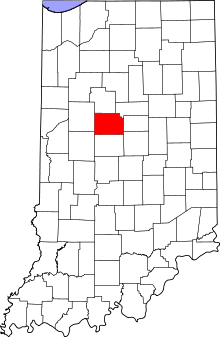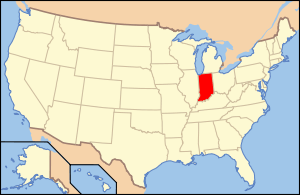Clinton County, Indiana
| Clinton County, Indiana | |
|---|---|
 Clinton County Courthouse in Frankfort, Indiana | |
 Location in the state of Indiana | |
 Indiana's location in the U.S. | |
| Founded | 1830 |
| Named for | DeWitt Clinton |
| Seat | Frankfort |
| Largest city | Frankfort |
| Area | |
| • Total | 405.25 sq mi (1,050 km2) |
| • Land | 405.07 sq mi (1,049 km2) |
| • Water | 0.18 sq mi (0 km2), 0.04% |
| Population | |
| • (2010) | 33,224 |
| • Density | 82/sq mi (31.67/km²) |
| Congressional district | 4th |
| Time zone | Eastern: UTC-5/-4 |
| Footnotes: Indiana county number 12 | |
Clinton County is a county located in the U.S. state of Indiana. As of 2010, the population was 33,224.[1] The county seat is Frankfort.[2]
History
Clinton County officially came into existence on March 1, 1830, and was named in honor of DeWitt Clinton,[3] the seventh Governor of New York State and architect of the Erie Canal. The act forming the county was approved by the Indiana General Assembly on January 29, 1830, and created Clinton from the eastern parts of neighboring Tippecanoe County.
Lieutenant General James F. Record was born and raised in Clinton County; Gen Record was awarded 3x Distinguished Service Crosses for his gallantry during the Vietnam War.[4]
Geography
According to the 2010 census, the county has a total area of 405.25 square miles (1,049.6 km2), of which 405.07 square miles (1,049.1 km2) (or 99.96%) is land and 0.18 square miles (0.47 km2) (or 0.04%) is water.[5]
Adjacent counties
- Carroll County (north)
- Howard County (northeast)
- Tipton County (east)
- Hamilton County (southeast)
- Boone County (south)
- Montgomery County (southwest)
- Tippecanoe County (west)
Cities and towns
Unincorporated towns
Extinct towns
Townships
Major highways
 Interstate 65
Interstate 65 U.S. Route 52
U.S. Route 52 U.S. Route 421
U.S. Route 421 Indiana State Road 28
Indiana State Road 28 Indiana State Road 29
Indiana State Road 29 Indiana State Road 38
Indiana State Road 38 Indiana State Road 39
Indiana State Road 39 Indiana State Road 75
Indiana State Road 75 Indiana State Road 26
Indiana State Road 26
Railroads
Climate and weather
| Frankfort, Indiana | ||||||||||||||||||||||||||||||||||||||||||||||||||||||||||||
|---|---|---|---|---|---|---|---|---|---|---|---|---|---|---|---|---|---|---|---|---|---|---|---|---|---|---|---|---|---|---|---|---|---|---|---|---|---|---|---|---|---|---|---|---|---|---|---|---|---|---|---|---|---|---|---|---|---|---|---|---|
| Climate chart (explanation) | ||||||||||||||||||||||||||||||||||||||||||||||||||||||||||||
| ||||||||||||||||||||||||||||||||||||||||||||||||||||||||||||
| ||||||||||||||||||||||||||||||||||||||||||||||||||||||||||||
In recent years, average temperatures in Frankfort have ranged from a low of 16 °F (−9 °C) in January to a high of 84 °F (29 °C) in July, although a record low of −26 °F (−32 °C) was recorded in December 1983 and a record high of 105 °F (41 °C) was recorded in July 1980. Average monthly precipitation ranged from 2.03 inches (52 mm) in February to 4.51 inches (115 mm) in June.[6]
Government
The county government is a constitutional body, and is granted specific powers by the Constitution of Indiana, and by the Indiana Code.
County Council: The county council is the legislative branch of the county government and controls all the spending and revenue collection in the county. Representatives are elected from county districts. The council members serve four-year terms. They are responsible for setting salaries, the annual budget, and special spending. The council also has limited authority to impose local taxes, in the form of an income and property tax that is subject to state level approval, excise taxes, and service taxes.[7][8]
Board of Commissioners: The executive body of the county is made of a board of commissioners. The commissioners are elected county-wide, in staggered terms, and each serves a four-year term. One of the commissioners, typically the most senior, serves as president. The commissioners are charged with executing the acts legislated by the council, collecting revenue, and managing the day-to-day functions of the county government.[7][8]
Court: The county maintains a small claims court that can handle some civil cases. The judge on the court is elected to a term of four years and must be a member of the Indiana Bar Association. The judge is assisted by a constable who is also elected to a four-year term. In some cases, court decisions can be appealed to the state-level circuit court.[8]
County Officials: The county has several other elected offices, including sheriff, coroner, auditor, treasurer, recorder, surveyor, and circuit court clerk. Each of these elected officers serves a term of four years and oversees a different part of county government. Members elected to county government positions are required to declare a party affiliation and to be residents of the county.[8]
Clinton County is part of Indiana's 4th congressional district; Indiana Senate districts 7 and 23;[9] and Indiana House of Representatives district 38.[10]
Demographics
| Historical population | |||
|---|---|---|---|
| Census | Pop. | %± | |
| 1830 | 1,423 | — | |
| 1840 | 7,508 | 427.6% | |
| 1850 | 11,869 | 58.1% | |
| 1860 | 14,505 | 22.2% | |
| 1870 | 17,330 | 19.5% | |
| 1880 | 23,472 | 35.4% | |
| 1890 | 27,370 | 16.6% | |
| 1900 | 28,202 | 3.0% | |
| 1910 | 26,674 | −5.4% | |
| 1920 | 27,737 | 4.0% | |
| 1930 | 27,329 | −1.5% | |
| 1940 | 28,411 | 4.0% | |
| 1950 | 29,734 | 4.7% | |
| 1960 | 30,765 | 3.5% | |
| 1970 | 30,547 | −0.7% | |
| 1980 | 31,545 | 3.3% | |
| 1990 | 30,974 | −1.8% | |
| 2000 | 33,866 | 9.3% | |
| 2010 | 33,224 | −1.9% | |
| Est. 2013 | 32,916 | −0.9% | |
As of the census[15] of 2000, there were 33,866 people, 12,545 households, and 9,057 families residing in the county. The population density was 84 people per square mile (32/km²). There were 13,267 housing units at an average density of 33 per square mile (13/km²). The racial makeup of the county was 89.38% White, 5.30% Black or African American, 0.14% Native American, 0.21% Asian, 0.02% Pacific Islander, 4.18% from other races, and 0.77% from two or more races. 7.32% of the population were Hispanic or Latino of any race. 28.8% were of American, 23.3% German, 10.0% Irish and 9.0% English ancestry according to Census 2000.
There were 12,545 households out of which 35.20% had children under the age of 18 living with them, 58.90% were married couples living together, 9.00% had a female householder with no husband present, and 27.80% were non-families. 23.60% of all households were made up of individuals and 11.10% had someone living alone who was 65 years of age or older. The average household size was 2.63 and the average family size was 3.10.
In the county the population was spread out with 27.30% under the age of 18, 8.80% from 18 to 24, 28.40% from 25 to 44, 21.10% from 45 to 64, and 14.40% who were 65 years of age or older. The median age was 36 years. For every 100 females there were 97.30 males. For every 100 females age 18 and over, there were 93.40 males.
The median income for a household in the county was $45,759, and the median income for a family was $53,864. Males had a median income of $36,385 versus $24,378 for females. The per capita income for the county was $17,862. About 6.30% of families and 8.60% of the population were below the poverty line, including 9.90% of those under age 18 and 9.00% of those age 65 or over.
See also
Further reading
- History of Clinton County, Indiana: Together with Sketches of Its Cities, Villages and Towns, Educational, Religious, Civil, Military, and Political ... Citizens. Charleston: Nabu Press (2010). ISBN 1-149-98613-1
References
- ↑ 1.0 1.1 "Clinton County QuickFacts". United States Census Bureau. Retrieved 2011-09-17.
- ↑ "Find a County". National Association of Counties. Retrieved 2011-06-07.
- ↑ Claybaugh, Joseph (1913). History of Clinton County, Indiana. Indianapolis: A. W. Bowen & Company. p. 31.
- ↑ http://www.af.mil/AboutUs/Biographies/Display/tabid/225/Article/105852/lieutenant-general-james-f-record.aspx
- ↑ "Census 2010 U.S. Gazetteer Files: Counties". United States Census. Retrieved 2011-10-10.
- ↑ 6.0 6.1 "Monthly Averages for Frankfort, Indiana". The Weather Channel. Retrieved 2011-01-27.
- ↑ 7.0 7.1 Indiana Code. "Title 36, Article 2, Section 3". IN.gov. Retrieved 2008-09-16.
- ↑ 8.0 8.1 8.2 8.3 Indiana Code. "Title 2, Article 10, Section 2" (PDF). IN.gov. Retrieved 2008-09-16.
- ↑ "Indiana Senate Districts". State of Indiana. Retrieved 2011-01-23.
- ↑ "Indiana House Districts". State of Indiana. Retrieved 2011-01-23.
- ↑ "U.S. Decennial Census". United States Census Bureau. Retrieved July 10, 2014.
- ↑ "Historical Census Browser". University of Virginia Library. Retrieved July 10, 2014.
- ↑ "Population of Counties by Decennial Census: 1900 to 1990". United States Census Bureau. Retrieved July 10, 2014.
- ↑ "Census 2000 PHC-T-4. Ranking Tables for Counties: 1990 and 2000" (PDF). United States Census Bureau. Retrieved July 10, 2014.
- ↑ "American FactFinder". United States Census Bureau. Retrieved 2008-01-31.
External links
- Clinton County Chamber of Commerce
- Clinton County History and Genealogy from US GenWeb
- Clinton County Economic Development
 |
Carroll County | Howard County |  | |
| Tippecanoe County | |
Tipton County | ||
| ||||
| | ||||
| Montgomery County | Boone County | Hamilton County |
| |||||||||||||||||||||||||